hi guys
i'm half way through my first amp repair and would like to know if i have to remove all of the left over electrolyte that is stuck to the PCB like super glue ??
cheers
gaz
i'm half way through my first amp repair and would like to know if i have to remove all of the left over electrolyte that is stuck to the PCB like super glue ??
cheers
gaz
A lot of old amps used glue to secure the larger capacitors to the board. If this is the case, and it's brown and crusty, and it is a Japanese amp, yes you need to remove all of it, because this glue turns corrosive over time and can damage components.
i've tried with ispro alcohol , im not keen on scraping it off as i'm clumsy and will probably do damage
i've tried with ispro alcohol , im not keen on scraping it off as i'm clumsy and will probably do damage
Solvent and a brush. No scraping.
if it were corrosive why would they use it !!!
Unfortunately they use the same glue even and now days.
A lot of Dvb decoders fail due to this glue usage.😕
if it were corrosive why would they use it !!!
Nobody expected the equipment to still be in use 40 years later - the glue worked well for the expected 10 year life of the equipment.
There's quite a few parts which age poorly, and a surprising number which are still working perfectly.
thanks for all your replies . i got off as much as i could, fingers crossed it doesnt go "pop".
gaz
gaz
But, is is *glue* or is it *electrolyte*?hi guys
i'm half way through my first amp repair and would like to know if i have to remove all of the left over electrolyte that is stuck to the PCB like super glue ??
cheers
gaz
VERY different things, yet confused by the unexperienced.
Please post a well illuminated picture, to check colour and texture.
But in principle I suspect it´s not electrolyte at all (which is a white crystalline salt and IS corrosive) but brownish contact cement, very popular in old Japanese Electronics against vibration. And quite neutral.
While modern use silicone or hot glue.
But please post a picture.
Nobody expected the equipment to still be in use 40 years later - the glue worked well for the expected 10 year life of the equipment.
There's quite a few parts which age poorly, and a surprising number which are still working perfectly.
That is eactly right!
Some people don't seem to understand that fact, and none the less complain about the equipment being crappy.
As I've always said - you wouldn't drive a vintage car after decades of neglect - not doing some service (lube, tires, etc) on it.
It's just Common Sense - something lacking in today's society.
But, is is *glue* or is it *electrolyte*?
VERY different things, yet confused by the unexperienced.
Please post a well illuminated picture, to check colour and texture.
But in principle I suspect it´s not electrolyte at all (which is a white crystalline salt and IS corrosive) but brownish contact cement, very popular in old Japanese Electronics against vibration. And quite neutral.
While modern use silicone or hot glue.
But please post a picture.
A simple way to tell if that old adhesive becomes "conductive" is to use a DVM's probes pressed into it, closely spaced, and the meter will show "ohms" instead of "0".
My Fluke meters always alerted me to this issue.
hi guys
having a bit of an issue setting my bias
Since there's no mention of what this unit is on this thread, the issue could be anything.
i replaced the caps for nichicon 10000uF 63V GU series, i also replaced the variable resistors for vishey T93 5K 1W
https://docs.rs-online.com/19c7/0900766b813cd34a.pdf
https://docs.rs-online.com/cdae/0900766b80ed9ad6.pdf
i brought the amp off of ebay and it sounded terrible, ive just tested it and it sounds much better if lacking some bass.
i will try ti upload pics
mt issue is that i cant seem to adjust the bias to the recommended spec.
gaz
https://docs.rs-online.com/19c7/0900766b813cd34a.pdf
https://docs.rs-online.com/cdae/0900766b80ed9ad6.pdf
i brought the amp off of ebay and it sounded terrible, ive just tested it and it sounds much better if lacking some bass.
i will try ti upload pics
mt issue is that i cant seem to adjust the bias to the recommended spec.
gaz
it didnt like me trying to unload all pics at once , but here they are
gaz
gaz
Attachments
-
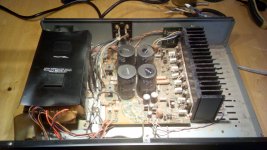 IMG_20200319_135708.jpg1,022.1 KB · Views: 283
IMG_20200319_135708.jpg1,022.1 KB · Views: 283 -
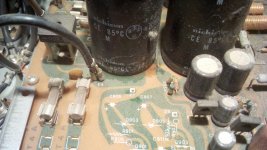 IMG_20200319_135720.jpg1 MB · Views: 242
IMG_20200319_135720.jpg1 MB · Views: 242 -
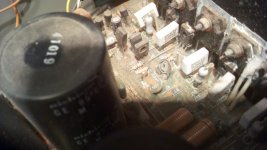 IMG_20200319_135743.jpg987.6 KB · Views: 249
IMG_20200319_135743.jpg987.6 KB · Views: 249 -
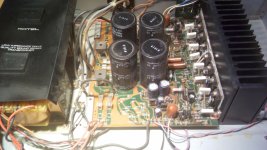 IMG_20200319_142104.jpg1,010.2 KB · Views: 236
IMG_20200319_142104.jpg1,010.2 KB · Views: 236 -
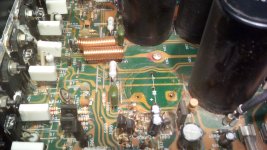 IMG_20200319_144305.jpg1,019.4 KB · Views: 233
IMG_20200319_144305.jpg1,019.4 KB · Views: 233 -
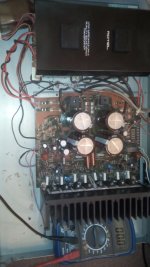 IMG_20200319_194941.jpg286.2 KB · Views: 156
IMG_20200319_194941.jpg286.2 KB · Views: 156 -
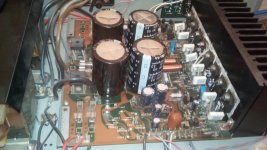 IMG_20200319_194958.jpg798.1 KB · Views: 162
IMG_20200319_194958.jpg798.1 KB · Views: 162
- Home
- Amplifiers
- Solid State
- capacitor electrolyte= super glue ?